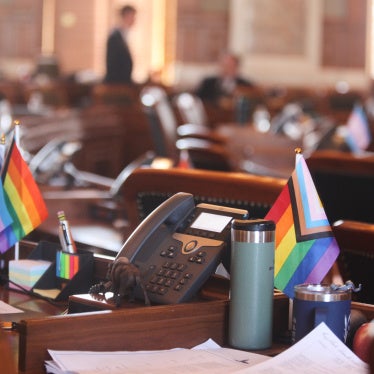Sandra Avery was once a crack user, and had been convicted three times for possessing $100 worth of the drug for personal use. But she pulled herself together, joined the army, earned an accounting degree, and on leaving the army got a good job. Years later, her life spun out of control. She married a crack dealer and started using again. Then she and her husband were arrested together for selling crack.
The prosecutor offered her a plea deal that could have brought a 10-year sentence, but when she refused, he sought a mandatory sentencing enhancement based on her prior convictions.
So instead of perhaps being locked up for 10 years, she’s in for life, without parole.
In the United States, Federal drug defendants who won’t plead guilty pay dearly, according to our new report, “An Offer You Can’t Refuse.” Prosecutors use their ability to vary the charges to seek longer mandatory sentences for people who turn down plea bargains. Defendants who go to trial receive sentences that, on average, are three times as long. Not surprisingly, 97 percent of drug defendants are convicted by pleas, not trial.
Sandra did break the law and should be punished. But the punishment should fit the crime. Her prosecutor believed 10 years behind bars would be appropriate if she pleaded guilty. So how can serving life without parole possibly be fair?
I asked her prosecutor why he pushed for such a high sentence if Sandra went to trial. His response: “Because it applied.” In other words, she had two priors and he could. Then I asked if he thought if the sentence was just. “No comment,” he answered.
Prosecutors have an incentive to plead people out – it’s faster and cheaper than going to trial. Also, a prosecutor’s credibility depends on making good on a threat of a stiffer sentence for those who turn down a plea bargain.
Over my 25 plus years at Human Rights Watch, I’ve written many reports focusing on policies that harm people who wouldn’t win a popularity contest. After all, you shouldn’t have to sympathize with, much less approve of, somebody to insist they should be treated with dignity and that their human rights should be respected.
But my work started out far away from US prisons. I’m one-quarter Venezuelan and my university studies focused on Latin America, which helped secure my first job with Human Rights Watch doing research in Colombia in 1985. I left after a few years, but returned in 1994, continuing to investigate abuses in Latin America. Two years later, I switched my focus to US criminal justice problems. In 2001, the US division was created and I was appointed its first director. I stepped down in 2007 to return to what I’m really passionate about – the research.
A couple of clear themes run through my years of human rights work. One relates to the so-called “War on Drugs,” – or more specifically, human rights issues that arise when you try to topple the drug market by punishing drug users and sellers. I researched how these abuses manifested in places like Bolivia, then followed the illicit money trail back to the US, where I investigated abuses connected to drug laws and law enforcement.
Drugs are capitalism at its purest – if there’s a demand, there will be supply. Over the last 40 years, drug law enforcement has done little to curb drug use, but it has yielded widespread abuses ranging from violence to egregiously harsh sentencing laws and a disproportionate number of African Americans behind bars for drug offenses.
Another thread that has run through my work is the abuse of power. Dictators during the dirty wars and in Latin America abused their power in certain ways. In the US, most of the direct and clear abuse of power occurs in the criminal justice system, because that’s where the federal government wields its weightiest weapons – it can deprive you of your liberty and of your life.
I’ve researched death sentences handed down to mentally disabled people, the US’s refusal to release old and dying prisoners, the lack of treatment for mentally ill prisoners, and the overuse of solitary confinement. I’ve also investigated pretrial detention for people too poor to afford bail and the use of dogs to force prisoners from their cells. These all exemplify the misuse and abuse of government power.
I believe the US criminal justice system has been warped since the 1980s, when there was tension around civil rights, drug use was rising, and violence in predominantly African American communities was growing. Combine this with partisan politics in which each party vied to be “tough on crime” and the political manipulation of concerns about drugs and race, and you get a system in which “too manyAmericans go to too many prisonsfor fartoo long,” as Attorney General Eric Holder said in August.
Now there’s a growing momentum for sentencing reform, in part because the US has realized it simply can’t afford to lock up so many people.
Still, it is hard to make people care about the excesses of the criminal justice system. Unless you have a family member in the system, you don’t think about it and you don’t care about it.
The human rights movement that took off in the l970s focused on middle class intellectuals and political dissidents in the former Soviet Union, who were subject to human rights violations because they wanted more political freedom. Then in the 1980s, there were the dirty wars in Latin America, with both violent and nonviolent opponents of military dictatorship tortured, executed and disappeared. If they were lucky, they were exiled.
There is a lot of public sympathy for people who are oppressed by governments. But protecting the human rights of people accused of committing ordinary crimes is different. I have found that some people have a hard time accepting that people who break the law – or who are accused of breaking the law – have rights that should be protected the same as theirs. It’s one thing to be concerned about a political dissident. It’s another to show concern for a murderer or a drug dealer.
But just because someone is convicted of a crime doesn’t give the government license to impose punishment that is cruel and unjust.
To me, that’s the real human rights challenge – protecting unpopular people whatever their circumstances, whatever they’ve done, wherever they live.Version:1.0
Sandra Avery falls into this category. I don’t know the right sentence for someone in her situation, but I don’t believe – and I suspect many would not believe – its life without parole. Especially a life sentence imposed not so much for her crime as for her refusal to plead guilty. That is simply a misuse of power. A crack seller deserves fair and just treatment at the hands of the government, the same as a political dissident.
Human rights aren’t only for the righteous. They protect the dignity of all, regardless of which side of the law someone is on.






